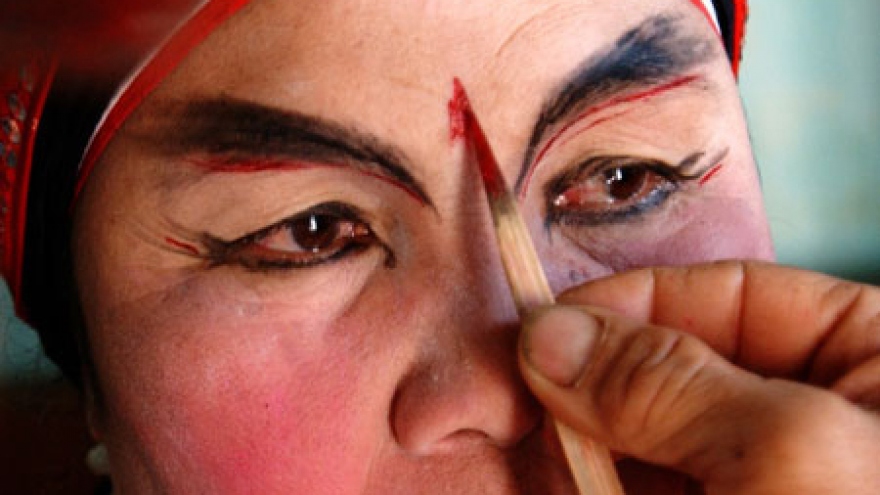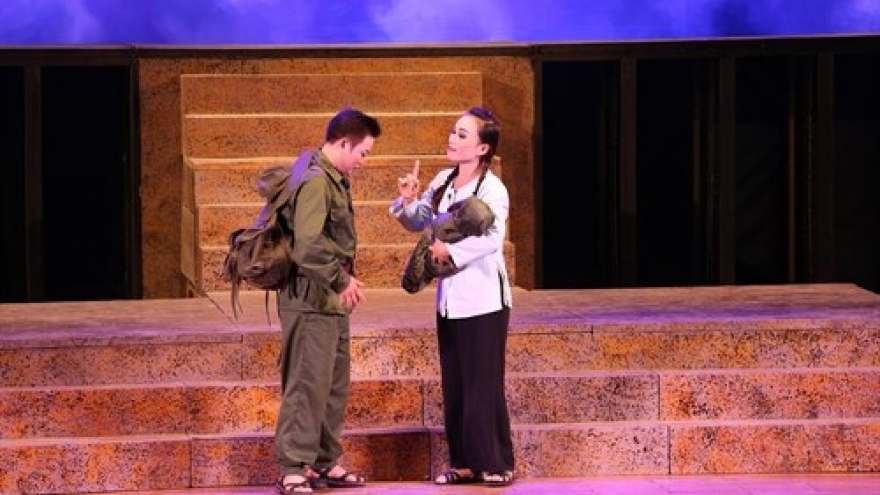Vitality of amateur 'tuong' art troupes
Amateur 'tuong' (classical drama) art troupes have laid the foundation for the development of 'tuong', as they have kept intact the original value of the traditional art form.
 |
In modern life, these troupes still have a firm position, as they have drawn the interest of a large number of audiences, including the youth.
Vietnamese people in rural areas throughout the country consider tuong an indispensable part in their spiritual life.
It was believed that the captivating charm which tuong had imposed on Vietnamese faded away decades ago. But this is not true, for tuong is consolidating its role in today’s life, particularly in rural areas—the cradle of tuong.
People are still fascinated by tuong plays and know tuong lines by heart just like tuong artists do.
Before the 1945 August Revolution, there were no professional tuong art troupes. Most of the clubs were groups of artisans from the same village or commune or they were family members, who gathered together to practice after work and performed for the public in their spare time.
Nowadays, aside from professional tuong troupes and theatres, there are around 80 amateur tuong clubs across the country, most of them from localities which are enthusiastic entrants in tuong competitions and having numerous fans of tuong.
Binh Dinh Province in particular is home to twenty amateur tuong clubs. The locality has seen a tuong phenomenon develop, with brilliant acting and beautiful singing, which are somehow even better than those of professional troupes.
This is the result of club members’ efforts to renovate their operations and improve the quality of their performances.
Market rules have shown that the more you practice, the better you can get in your performance and the more money you can earn from audiences. That is why some non-professional troupes in Binh Dinh can do up to two or three shows a day.
The amateur artists are helping to prevent tuong from being forgotten. The head of the tuong troupe in Phu Man Village, Yen Phong District, Bac Ninh Province, said that his club’s operations did not aim to earn money as a priority, but rather to preserve the traditional cultural treasure.
He said it was impossible to force youngsters to get interested in tuong, but that we should educate them about the beauty of tuong and attract them with authentic performances.
With only 32 members from different social backgrounds, the troupe is professionally organised with specific tasks assigned to the head and deputy heads of male and female artists’ groups and the orchestra, an arts council and an arts director.
Aside from the Phu Man troupe, Yen Phong District is also home to other tuong clubs.
Nguyen Thi Hoan, head of Yen Phong District’s tuong troupe, recalled that during the first days of operations, her club members had to borrow costumes and equipment from other troupes in the region or from the Vietnam Tuong Theatre.
“No matter how hard it is, we strive to overcome difficulties because love for tuong is in our blood,” she said.
According to Associate Professor and Doctor Le Thi Hoai Phuong from the Vietnam Institute of Culture and Arts Studies, the amateur tuong troupes in the localities not only create inspirational venues for residents, but also create a new way to develop tuong in modern life.
Above all, the troupes have contributed to safeguarding tuong for the public.
The Hanoi’s Folk Stage Festival in 2014 attracted 30 amateur stage art troupes, whose performances won the praise of the jury, arts researchers and critics as they kept intact the authentic spirit of the traditional tuong art form.
No video, CD or document can record and preserve tuong better than public performances by local artists. It is also heartening to see that the art form has attracted the participation of more and more young artists, who follow their elders to prevent tuong from being ignored in today’s era of integration and globalisation.
The upcoming National Amateur Tuong Festival 2016, scheduled to be held in Binh Dinh Province from December 10-20, will provide a good opportunity for amateur tuong artists to compete while exchanging experiences and learning from each other.
Van Trong Hung, Director of the representative office of the Centre for Research, Preservation and Development of Vietnam’s Ethnic Culture in Binh Dinh, said that by attending the festival, the amateur tuong clubs could better their practice, hone their skills, show off their talent and nurture and their passion for tuong.
It can be concluded that amateur troupes have created a firm foundation and healthy environment for the development of the traditional Vietnamese art form of tuong.


